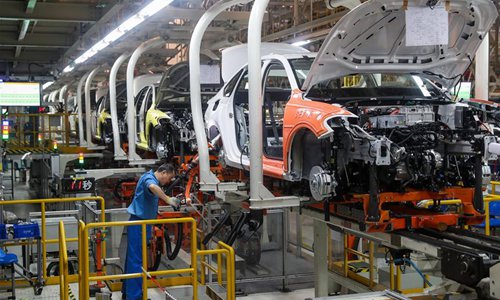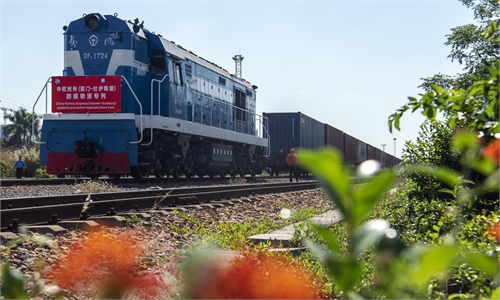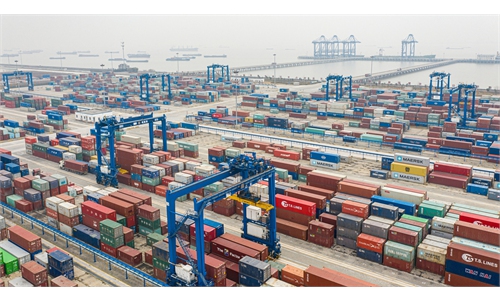
A staff member works at a production line of SAIC Volkswagen in east China's Shanghai, Oct. 29, 2019. (Xinhua/Ding Ting)
Some German enterprises have said that they still value the Chinese market and expand even further, even though the German government has reportedly refused to guarantee German companies' investment projects in China, citing "human rights violations" in Northwest China's Xinjiang Uygur Autonomous Region, which have been widely debunked by Chinese authorities.
As one of the first international partners in China's automotive industry, Volkswagen Group has grown together with the Chinese market over four decades. One example of this long-term partnership is the SAIC Volkswagen plant in Urumqi, which started production of vehicles in 2013 and has an annual capacity of 50,000.
It is currently manufacturing two Volkswagen brand models, Santana and Tharu, SAIC Volkswagen said in a reply to the Global Times on Monday.
Volkswagen Group China said that "we believe in the long-term economic potential in the west of China and we remain committed to the development of the Chinese market. Together with our employees and partners, we will continue to offer outstanding products for Chinese customers."
The comment came after some foreign media outlets reported that Germany's Economy Ministry had refused to provide carmaker Volkswagen with guarantees to cover new investments in China, citing concerns over "human rights violations" in the Xinjiang region.
The ministry confirmed it had turned down four applications from a company but declined to identify the company. Der Spiegel said, without specifying its sources, that Volkswagen was the company in question.
Volkswagen Group said in a statement that "we have not yet received a response to our requests from the German government. We are awaiting a decision. Of course, a rejection is also possible."
Chinese observers said it is regrettable that the latest example occurred in Germany, and although it does not represent the whole picture of China-Germany relations, it is a countercurrent that cannot be ignored.
The German government's refusal to provide "investment guarantees" for Volkswagen will not have a direct impact on Volkswagen's operations in China, but it sends a bad signal - that is, the pragmatic and rational policy toward China that the Merkel government always adhered to as being positive is being casted with an ideological shadow, the observers said.
The new German government and German companies are taking a different stance on the issue, with some German politicians moving away from the Merkel-era pragmatic approach toward China-Germany economic cooperation, Zheng Chunrong, director of the German Studies Centre at Tongji University, told the Global Times on Monday.
Some German politicians are seeking to politicize mutually beneficial economic and trade cooperation, Zheng said, noting that the US' influence is behind the trend.
However, the mainstream of German companies - investors on the ground in China - continue to count on the potential of the Chinese market, and make their decisions based on reality and necessity, Zheng said, adding that efforts in diversifying investment may end up in China anyway as a comparative alternative is nearly nonexistent.
Reuters reported on June 1 that Volkswagen will strengthen its relationship to China, citing Chief Executive Herbert Diess' comments to German broadcaster RTL.
"China will remain an engine of growth," Diess said. "We will engage even more strongly there."
Despite COVID-19 outbreaks in China, 77 percent of respondents to the EU Chamber of Commerce in China's survey in late April said they were not considering shifting current or planned investments to other markets.
Data from Volkswagen Group showed that in 2021, Volkswagen Group China, together with its Chinese joint ventures, delivered 3.3 million vehicles in the Chinese mainland and Hong Kong despite global semiconductor supply bottlenecks.
The Volkswagen brand, including JETTA, delivered over 2.4 million vehicles in 2021, with a market share of 11.7 percent, remaining the No.1 brand in the Chinese market.



